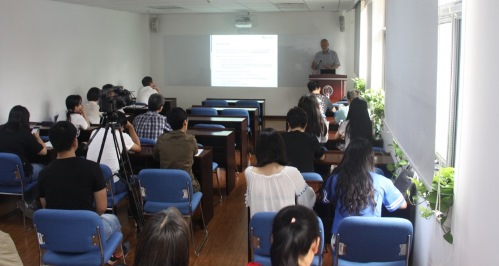Prof. Hans Peter Peters Visits CRISP
By the invitation of CRISP, Prof. Hans Peter Peters from the Forschungszentrum Jülich (Jülich Research Centre) visited CRISP during July 10-14, 2017. His visit is to launch the thesaurus research on PSCT Network literatures. Prof. Hans Peter Peters is the member of scientific committee of PCST Network as well.
PCST Network currently remains the largest international organization in the field of international science communication study and practice. The academic literatures accumulated from every PCST Annual Conference provide valuable academic resources for the in-depth study of science communication. During his visit, Prof. Hans Peter Peters engaged with research team from CRISP to jointly find proper ways to define and classify keywords for PCST literatures, the aim is to conduct preparatory work for a further study of trend in this regard.
During the visit, Prof. Hans Peter Peters delivered a lecture entitled “Medialization of science: A recent paradigm in science communication research” on July, 13th. The report was chaired by Deputy Director of CRISP Dr. Wang Yuping and Director-General of CRISP Prof. Wang Kangyou showed his presence there as well. It attracted many participants from CRISP, Beijing Normal University and University of Science and Technology of China, etc.

In his presentation, Prof. Hans Peter Peters presented a profound analysis on views of the “Medialization of science” theory created by Prof. Peter Weingart through empirical studies. He pointed out that, scientists and scientific organizations admit that media poses positive impacts on science communication to some extent, and that such trend of “medicalization of science in the field of science culture” shall be valued. He further illustrated that in the field of science communication, scientists find themselves gradually adapt to the standards set by the media, and they would partly adjust their research and publications in line with the standards. What’s more, Prof. Hans Peter Peters shows that the factors affecting the relationship between science and media include not only the degree of medialization of science, but also the differences due to cross-cultures and inter-disciplines.
The lecture aroused strong interests of attendees and heated discussions were held around it. In the end, Director-General Prof. Wang Kangyou spoke highly of the report as a rare learning opportunity, viewing that Prof. Hans Peter Peters’ content and points epitomized in the report would provide theoretical implications for science communication informationization work, as well as encouraging thoughts and references for theoretical and practical studies on science communication.
